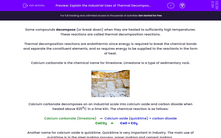Some compounds decompose (or break down) when they are heated to sufficiently high temperatures.
These reactions are called thermal decomposition reactions.
Thermal decomposition reactions are endothermic since energy is required to break the chemical bonds and separate the constituent elements, and so requires energy to be supplied to the reactants in the form of heat.
Calcium carbonate is the chemical name for limestone. Limestone is a type of sedimentary rock.

Calcium carbonate decomposes on an industrial scale into calcium oxide and carbon dioxide when heated above 825oC in a lime kiln. The chemical reaction is as follows:
Calcium carbonate (limestone) ⇔ Calcium oxide (quicklime) + carbon dioxide
CaCO3 ⇔ CaO + CO2
Another name for calcium oxide is quicklime. Quicklime is very important in industry. The main use of quicklime is in the steel making process, paper making and cement making.
This reaction is a reversible reaction - this is because the quicklime is not stable and, when cooled, will spontaneously react with CO2 from the air until it is completely converted back to calcium carbonate unless slaked with water.
Ready to try some questions now?







